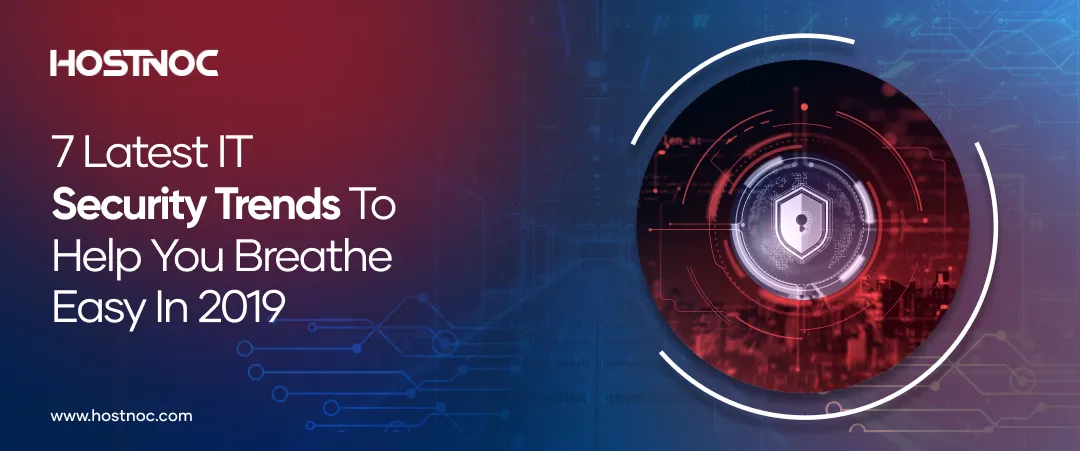Blogs

5 Ways to Make Your Dedicated Servers More Secure
December 6, 2018
7 Common Tactics Cybercriminals Use To Launch A Successful Cyber Security Attack
December 24, 20187 Latest IT Security Trends to Help you Breathe Easy In 2019
If you look at 2018 from a security standpoint, there is a lot that has conspired over the course of the last 12 months. 2019 will be no different. Predicting trends is not easy, especially when we talk about an industry like cyber security that evolves every day. With data privacy and security being the major concerns for businesses and attackers finding new ways to infiltrate enterprise security system, businesses have their work cut out when it comes to securing their digital assets.
What does 2019 have in store for IT security professionals? Here are seven IT security trends you need to look out for in 2019.
- 1. Use of AI in Security Solutions
- 2. Blurring the Lines Between Physical Security and Cybersecurity
- 3. Lesser, More Targeted Ransomware
- 4. Public Outcry Will Drive Data Privacy Policies
- 5. Advanced Threat Protection Incorporated into Products
- 6. Multi-Factor Authentication Will become a Norm
- 7. Say “Goodbye” To Passwords
1. Use of AI in Security Solutions
With the frequency and complexity of cyber security attacks growing by the day, AI can come to your rescue. AI can help you tackle modern day cyber-attacks. We saw the introduction of AI-based solutions in 2018 and the trend will continue in 2019. According to ESG research, 12% of enterprises have already deployed AI-based security solutions and 27% of organizations have done so at a limited scale. 2019 will be the year where we see these percentages grow exponentially as more and more businesses embrace AI based security solutions.
2. Blurring the Lines Between Physical Security and Cybersecurity
The lines between physical and cyber security have blurred to the point that it is almost impossible to see both as different entities. With IoT devices going mainstream and the trend of BYOD taking off, we will see more companies merging cyber-security with physical security to prepare a holistic security plan to keep their digital assets safe. Make sure that you keep an eye on cybersecurity red flags to stay safe. Don’t be surprised to see some more team crossovers in 2019.
3. Lesser, More Targeted Ransomware
Yes, there has been a decline in the number of ransomware attacks but that does not mean that you should stop lower your guard. According to Kaspersky, there has been a 30% decline in the number of ransomware attacks an yearly basis. We will see more focused and targeted ransomware attacks in 2019 and businesses will invest in security solutions that can protect against such attacks.
For instance, a group of ransomware attackers responsible for SamSam, has now directed its folly to the few US companies operating across Healthcare and Municipal sectors, according to Symantec. The decline in the number of ransomware attacks is attributed to the popularity of crypto-jacking. There has been an exponential increase of 44.5% in crypto-jacking attacks. Hidden crypto-miners will continue to proliferate and malware authors will take advantage of them in their wake to disrupt your business.
4. Public Outcry Will Drive Data Privacy Policies
Rising data breaches and data privacy issues have led to the implementation of General Data Protection Regulation (GDPR). Governing bodies will continue to slap organizations with penalties on security breaches. Tech giants such as Google and Facebook involved in surveillance and selling user data to third parties will have a bumpy ride in 2019 as users continue to file complaints against them. It is important to see how governing bodies react to always piling user complaints against tech companies. The user reaction on the news of security breaches will force companies to change their data privacy policy.
5. Advanced Threat Protection Incorporated into Products
Microsoft has kickstarted a trend that will be adopted by other companies in 2019. It is a trend of equipping your products with advanced threat protection capabilities. Microsoft made this move to build a security-focused brand image by making these features a standard across all their services. In fact, this will also give Microsoft products a clear competitive edge over IBM’s products. We will see other companies jumping on this bandwagon in 2019.
6. Multi-Factor Authentication Will become a Norm
Although there exists no solution to keep all your online transactions safe, you can minimize the risk significantly by taking precautionary measures. One such protection is multi-factor authentication. By only using a password to log in, we are exposing ourselves to phishing and other types of attacks and businesses have only just begun to comprehend it.
Companies will implement multi-factor authentication, which might seem cumbersome to users and might even frustrate some users, but it is the right way to go when it comes to keeping you safe online. Users will continue to suffer and deal with the complex login process until a standardized process has been developed but that is the price you have to pay for better security.
7. Say “Goodbye” To Passwords
Gone are the days when passwords were the only way to authenticate your identity. Today, we have many different options to fortify that step. From fingerprint scanning to iris scanning, and facial ID to voice-based identification, we have come a long way. As other identification mechanisms go mainstream, we will see the death of passwords. With modern-day smartphones using different scanners for identification, typing in a password to log in seems almost medieval. As these identification mechanisms become more efficient, people will begin weaning off passwords. In a nutshell, biometrics will replace passwords sooner than you think.
Which IT security trend do you think will make the biggest impact in 2019? Feel free to share it with us in the comments section below.
Featured Post
7 Cybersecurity Trends That Will Dominate in 2026
As we approach 2026, the digital landscape continues to evolve at an unprecedented pace, bringing both innovation and new threats. Cybersecurity has become a cornerstone of […]
Black Hat 2025: 10 Cool New Cybersecurity Products Announced At The Conference
Black Hat 2025 conference took place from August 2–7 2025 in Las Vegas, saw a wave of next‑gen security tools focused on AI, agentic systems, data […]
Alarming 5 Findings in IBM’s Cost of Data Breach 2025
Table of Contents 5 Key Takeaways from IBM’s Cost of Data Breach Report 2025 1. AI Is Both a Cybersecurity Ally and an Emerging Target 2. […]












